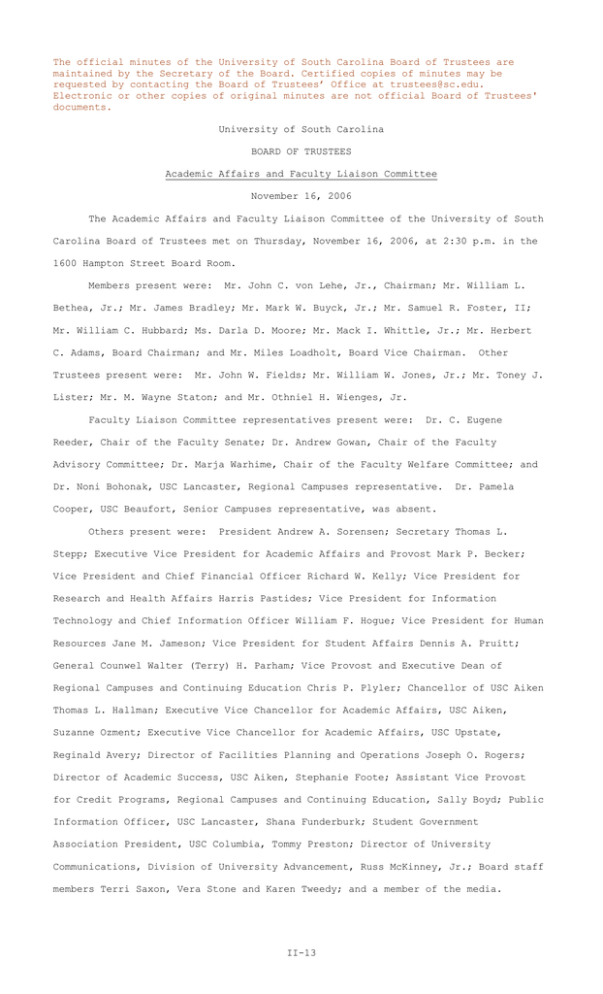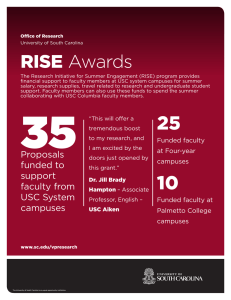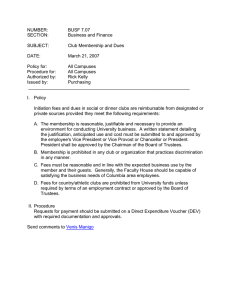The official minutes of the University of South Carolina Board... maintained by the Secretary of the Board. Certified copies of...
advertisement

The official minutes of the University of South Carolina Board of Trustees are maintained by the Secretary of the Board. Certified copies of minutes may be requested by contacting the Board of Trustees’ Office at trustees@sc.edu. Electronic or other copies of original minutes are not official Board of Trustees' documents. University of South Carolina BOARD OF TRUSTEES Academic Affairs and Faculty Liaison Committee November 16, 2006 The Academic Affairs and Faculty Liaison Committee of the University of South Carolina Board of Trustees met on Thursday, November 16, 2006, at 2:30 p.m. in the 1600 Hampton Street Board Room. Members present were: Mr. John C. von Lehe, Jr., Chairman; Mr. William L. Bethea, Jr.; Mr. James Bradley; Mr. Mark W. Buyck, Jr.; Mr. Samuel R. Foster, II; Mr. William C. Hubbard; Ms. Darla D. Moore; Mr. Mack I. Whittle, Jr.; Mr. Herbert C. Adams, Board Chairman; and Mr. Miles Loadholt, Board Vice Chairman. Trustees present were: Other Mr. John W. Fields; Mr. William W. Jones, Jr.; Mr. Toney J. Lister; Mr. M. Wayne Staton; and Mr. Othniel H. Wienges, Jr. Faculty Liaison Committee representatives present were: Dr. C. Eugene Reeder, Chair of the Faculty Senate; Dr. Andrew Gowan, Chair of the Faculty Advisory Committee; Dr. Marja Warhime, Chair of the Faculty Welfare Committee; and Dr. Noni Bohonak, USC Lancaster, Regional Campuses representative. Dr. Pamela Cooper, USC Beaufort, Senior Campuses representative, was absent. Others present were: President Andrew A. Sorensen; Secretary Thomas L. Stepp; Executive Vice President for Academic Affairs and Provost Mark P. Becker; Vice President and Chief Financial Officer Richard W. Kelly; Vice President for Research and Health Affairs Harris Pastides; Vice President for Information Technology and Chief Information Officer William F. Hogue; Vice President for Human Resources Jane M. Jameson; Vice President for Student Affairs Dennis A. Pruitt; General Counwel Walter (Terry) H. Parham; Vice Provost and Executive Dean of Regional Campuses and Continuing Education Chris P. Plyler; Chancellor of USC Aiken Thomas L. Hallman; Executive Vice Chancellor for Academic Affairs, USC Aiken, Suzanne Ozment; Executive Vice Chancellor for Academic Affairs, USC Upstate, Reginald Avery; Director of Facilities Planning and Operations Joseph O. Rogers; Director of Academic Success, USC Aiken, Stephanie Foote; Assistant Vice Provost for Credit Programs, Regional Campuses and Continuing Education, Sally Boyd; Public Information Officer, USC Lancaster, Shana Funderburk; Student Government Association President, USC Columbia, Tommy Preston; Director of University Communications, Division of University Advancement, Russ McKinney, Jr.; Board staff members Terri Saxon, Vera Stone and Karen Tweedy; and a member of the media. II-13 Chairman von Lehe called the meeting to order and invited those Board members present to introduce themselves. Mr. McKinney introduced a member of the media who was in attendance. Chairman von Lehe stated that notice of the meeting had been posted and the press notified as required by the Freedom of Information Act; the agenda and supporting materials had been circulated to the Committee and a quorum was present to conduct business. Chairman von Lehe called on President Sorensen who was most pleased to announce that Trustee Darla Moore had accepted the University’s invitation to be the December commencement speaker; she will receive an honorary Doctor of Business Administration degree during the ceremony. President Sorensen also noted that The Wall Street Journal had published an “enormously interesting” article entitled “Beyond Berkeley” this past Friday. The report focused on “up and comers” which were defined as “universities that are improving both the caliber of students admitted and their academic offerings according to admissions deans at top graduate schools, college advisors and recruiters.” As one of those institutions, Carolina was characterized as having “a strong business school and designated by the Carnegie Foundation as an institution of very high research activity.” Further noted in the article was the fact that the University “has seen applications rise 57 percent over the past decade.” The eight featured institutions were: University of Delaware (rated #27 in U.S. News and World Report); University of Florida (tied for #13 in U.S. News and World Report); University of Wisconsin at Madison (ranked #7 in U.S. News and World Report); University of Georgia (ranked #21 in U.S. News and World Report); the University of California at Santa Barbara (tied for #13 in U.S. News and World Report); and the University of South Carolina. Copies of the article were distributed to all Board members. President Sorensen expressed that he was “enormously proud that what we have accomplished is being recognized nationally.” In addition, he had met with the regional reporter from that newspaper this past Tuesday who was very intrigued with Carolina activities. The reporter will visit the campus within the first six weeks of the spring semester in order to gather information for an article exclusively about Carolina. Mr. Whittle stated that he hoped that this press notice was part of an ongoing, organized plan to improve and increase institutional recognition. Chairman von Lehe stated that there were personnel matters dealing with recommendations for honorary faculty titles, honorary degree nominations, and midyear tenure and promotion recommendations which were appropriate for discussion in Executive Session. II-14 Chairman von Lehe called for a motion to enter Executive Session. Bradley so moved. Mr. Buyck seconded the motion. Mr. The vote was taken, and the motion carried. The following individuals were invited to remain: President Sorensen, Secretary Stepp, Dr. Becker, Mr. Kelly, Dr. Pastides, Dr. Hogue, Dr. Pruitt, Ms. Jameson, Dr. Plyler, Mr. Parham, Mr. McKinney, Mrs. Saxon, Ms. Stone, and Ms. Tweedy. II-15 Return to Open Session I. Program Proposal: Post Baccalaureate Certification in English for Speakers of Other Languages, School of Education, USC Upstate: Chairman von Lehe called on Executive Vice Chancellor Avery who stated that USC Upstate was requesting Board consideration of this post baccalaureate certification program because it had been determined that there was an increasing need for teachers to have the skill and knowledge to teach English to those individuals whose primary language was not English. He noted that this certificate will provide the specialized courses allowing certified teachers to acquire the fifteen hours currently required by the South Carolina State Department of Education for endorsement in English for Speakers of Other Languages (ESOL); tuition will cover the cost of the program. Mr. Hubbard moved approval of the Post Baccalaureate Certification in English for Speakers of Other Languages as described in the materials distributed for the meeting. Mr. Whittle seconded the motion. The vote was taken, and the motion carried. II. USC Aiken First Pace Summer Program Report: Chairman von Lehe called on Chancellor Hallman who explained that in the spring of last year USC Aiken had requested Executive Committee approval of a special tuition rate for an optional program which would be available in the summer to those USC Aiken students whom it was believed would benefit from an introduction to college level activities. He introduced Dr. Suzanne Ozment, Executive Vice Chancellor for Academic Affairs at USC Aiken, who provided a summary of their first Pace Program which was piloted this past summer. The program was offered as an option to students who had been identified as “academically at risk.” A total of 18 students chose to participate, most of whom were in that target population; 13 successfully completed the program. were required to complete English 101 with a grade of “C” or higher. Students The other components of the program were composed of very intensive tutorials as well as study skills workshops and individual sessions tailored to the students’ particular needs. Of the five who did not complete the program, four were categorized as having “significant academic deficiencies” in their level of preparation; the fifth individual, it was believed, displayed a lack of motivation. Follow-up surveys and focus-group interviews had been conducted; feedback regarding the experience had been very positive. the participants were: Two primary benefits indicated by (1) a better understanding of college level work; and (2) the formation of friendships which enabled them to “feel more comfortable” when they began fall semester classes. II-16 Inquiries were also sent to the faculty within the past week requesting information about the performance of these students in their classrooms. Projected semester grades were submitted based on student work to date; also reported were attendance patterns and the level of effort the students expended. Dr. Ozment reported that 1 student in the target group had withdrawn from the University. Of the 17 who remained, 11 were currently in “good academic standing” (their projected grade point average for the semester was at least a 2.0); 4 were projected to earn at least a 3.0 G.P.A. She was also pleased to report that several had taken advantage of academic support services (i.e., tutorial opportunities). It was believed that their summer exposure had demonstrated the importance of these various services. Conclusions reached at this point were primarily twofold: (1) offering this program as an option did not reach the vast majority of students who most needed to participate; therefore, a mandatory provisional admission program will be offered beginning the summer of 2007; and, (2) although minor adjustments were needed, the underlying model had proved to be quite successful. Those high school students ranked between the 30th and 50th percentiles in their graduating class will be carefully reviewed and will most likely be required to complete this provisional program. They will be placed in either English 101 or the Freshman Mathematics course and must earn a minimum grade of “C” in order to be admitted in the fall. Responding to Ms. Moore’s inquiry about the number of freshmen at USC Aiken who had graduated from high school in that percentile range, Dr. Ozment indicated that 150 students would have been “told they would have to participate in the provisional program before they could be admitted” had it been mandatory. Chancellor Hallman explained that previously USC Aiken’s formula for predicting academic success had included the SAT score, the high school G.P.A., the core collegiate college prep courses and high school class standing. For the Fall of 2006, the administration had decided not to admit anyone who ranked below the 30th percentile in high school class standing regardless of the individual’s other indicators. It was believed that this indicator clearly demonstrated a level of motivation needed to succeed at the college level. Ms. Moore asked that USC Aiken provide data which cataloged a range of entering freshman SAT scores (i.e., 1200-1400; 800-1000) and the concomitant G.P.A. results at the conclusion of the first year; Chancellor Hallman will address this request. Chairman von Lehe thanked Chancellor Hallman and Dr. Ozment and stated that the report was received as information. III. Other Matters: II-17 A. Bachelor of Arts in Liberal Studies - Regional Campuses: Chairman von Lehe called on Vice Provost Chris Plyler who was presenting for Committee consideration the Bachelor of Arts in Liberal Studies degree - Regional Campuses, a degree the two year regional campuses faculty members had been formulating for the past seven years. He explained that this degree program will be delivered via an interactive video system which had been financed with lottery technology funding. Vice Provost Plyler further noted that the senior campuses had collaborated with the two year campuses to offer baccalaureate degrees in business and education and those programs had been very successful. This particular degree will have three areas of concentration specifically geared to those students who were not able to attend classes on any of the senior campuses: social and behavioral sciences, the arts and humanities, and science and mathematics. Mr. Foster moved approval of the Bachelor of Arts in Liberal Studies - Regional Campuses as described in the materials distributed for the meeting. Ms. Moore seconded the motion. Responding to Ms. Moore’s inquiry about the cost of the program, Vice Provost Plyler indicated that the technical infrastructure had been installed and the faculty was already teaching the various courses; minimal funding would be expended to train them to teach via distance education. Ms. Moore also asked if a needs assessment survey had been conducted. Vice Provost Plyler replied that students were continuously queried; interviews were held as students entered the various associate programs on the two year campuses and exit interviews were conducted following graduation. Responses had overwhelmingly indicated that students wanted an arts and letters baccalaureate program. The vote was taken, and the motion carried. Mr. Whittle asked that the Committee receive updates on an ongoing basis regarding all the University’s academic endeavors. President Sorensen will present the first such report at the February Board of Trustees meeting. B. Report from Faculty Welfare Committee: At the request of Dr. Gene Reeder, Chair of the Faculty Senate, Mr. von Lehe called on Dr. Marja Warhime, Chair of the Faculty Welfare Committee, who reported that the committee had sponsored a survey of the faculty this past spring regarding recruitment and retention. One of the five priorities the faculty listed was “tuition aid for faculty children.” She noted that available tuition aid for faculty (primarily Life Scholarships and Palmetto Fellowships) had not kept pace with increasing tuition costs “putting faculty at a disadvantage in sending their children to USC II-18 and leading both prospective and current faculty to consider other institutions that offer this benefit.” Dr. Warhime further noted that slightly more than one in five of the survey respondents indicated that they knew of a faculty member for whom the availability of tuition waivers was a factor in their decision to choose another institution. On behalf of the Faculty Welfare Committee, Dr. Warhime urged the Board of Trustees to consider the possibility of tuition waivers for University faculty children who satisfied admission requirements. It was believed that this benefit would not only be a significant recruitment and retention tool, but also an important sign to faculty of their value to the University. Mr. Hubbard suggested that the University consider the possibility of bridging the gap between University tuition and the Life Scholarship. President Sorensen asked that the Board of Trustees study such a policy and suggested that Mr. Kelly, Chief Financial Officer, generate a report which delineated the financial impact. Chairman von Lehe invited Mr. Kelly to present this report at the next Academic Affairs and Faculty Liaison Committee. Since there were no other matters to come before the Committee, Chairman von Lehe declared the meeting adjourned at 3:25 p.m. Respectfully submitted, Thomas L. Stepp Secretary II-19

